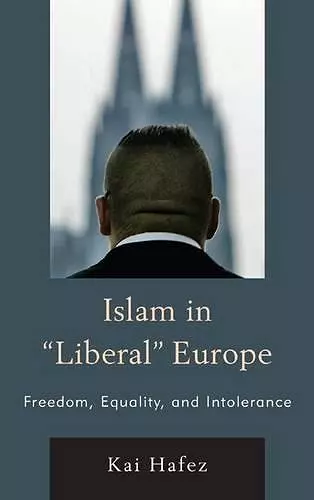Islam in Liberal Europe
Freedom, Equality, and Intolerance
Format:Hardback
Publisher:Rowman & Littlefield
Published:7th Feb '14
Should be back in stock very soon

Islam in "Liberal" Europe provides the first comprehensive overview of the political and social status of Islam and of Muslim migrants in Europe. Kai Hafez shows that although legal and political systems have made progress toward recognizing Muslims on equal terms and eliminating discriminatory practices that are in contradiction to neutral secularism, “liberal societies” often lag behind. The author argues that Islamophobic murders in Norway and Germany are only the tip of the iceberg of a deep-seated inability of many Europeans to accept cultural globalization when it hits close to home. Although there have always been anti-racist elites and networks in Europe, Hafez contends that the dominant tradition even among seemingly liberal intellectual milieus and their media is Islamophobic. This fact finds expression not only in the growing anti-Islam sentiment among right-wing populists but sometimes also in so-called enlightened forms of contemporary media, public opinion, school curricula, and Christian interfaith dialogues. In addition to offering a critical assessment of positive and negative trends in Islamic-Western relations, Hafez also engages in a theoretical debate revolving around integration, tolerance, multicultural liberalism, and modern liberal democracy. He combines political philosophy and political and social theory with current analysis on communication and the role of both religious and secular institutions in community-building in modern societies. In essence, the author debates the question of whether liberal society in Europe, in order to avoid a growing gap between integrative politics and discriminatory societies, needs a complete renewal not only of political ideologies but also of cultures and institutions.
The 16th-century Peace of Westphalia, ending the Hundred Years War, is considered a milestone on the road to removing sectarian conflicts from the arenas of war and politics in Western Europe. Now that the Muslim population in Western Europe exceeds five percent, is rapidly rising, and is concentrated in a relatively small number of urban areas, new sets of challenges to church-state relations—long thought dormant—are reemerging. Hafez’s careful comparisons of the legal, political, cultural, and intellectual challenges flowing from these demographic changes show just how unsettled these issues are. His in-depth analyses of France, Germany, and the UK, in particular, show surprising variations both in public attitudes and legal approaches to mosque/state issues. Blatant prejudice against Muslims, Hafez shows, is characteristic not just of some of the more virulent rightist parties but is also found in the mainstream media, in centrist politics, and in academia. . . .[H]is case for a reexamination of the true nature of multicultural liberalism, secularism, and religious tolerance is timely and on point. This is an important book, raising important questions about challenging issues. Summing Up: Highly recommended. Upper-division undergraduate, graduate, and research collections. * CHOICE *
Hafez’s well-documented argument and theoretically founded reflections reach far beyond the usual critique of Islamophobia. * Internationale Politik *
Kai Hafez gets to the bottom of the most essential questions of our time. * Wiener Zeitung *
Kai Hafez’s book offers a theoretical and systematic basis for one of the key questions of European migratory society—the integration of Islam. -- Klaus J. Bade, University of Osnabrück, Germany
ISBN: 9781442229518
Dimensions: 240mm x 162mm x 32mm
Weight: 717g
416 pages